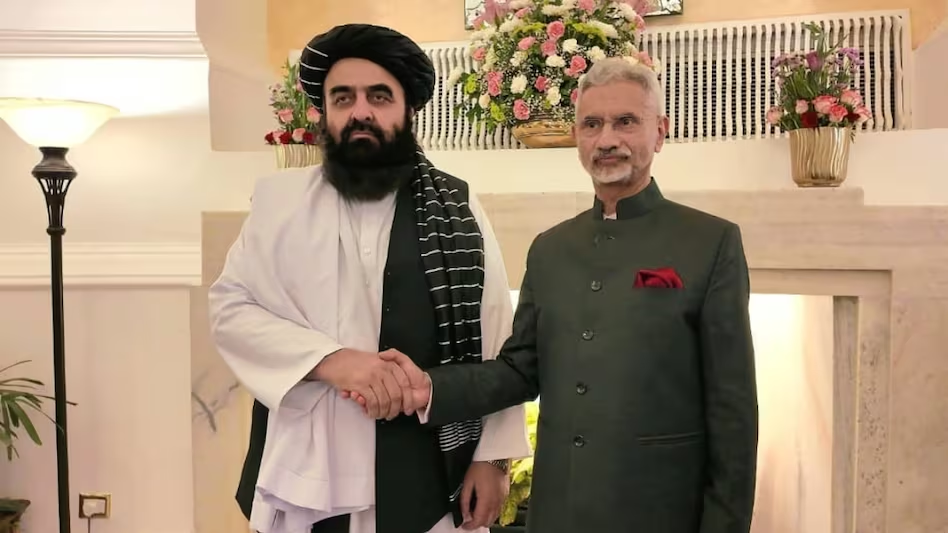India to Reopen Embassy in Kabul After Four Years, Signalling a Major Diplomatic Shift
In a landmark diplomatic development, India announced its decision to reopen its embassy in Kabul, four years after it was shut down following the Taliban’s takeover of Afghanistan in 2021.
The announcement came after a bilateral meeting between External Affairs Minister Dr. S. Jaishankar and Afghanistan’s Taliban Foreign Minister Amir Khan Muttaqi in New Delhi on Friday — marking the first high-level engagement between the two sides since the Taliban’s return to power.
This meeting represents a significant recalibration in India’s Afghanistan policy, reflecting New Delhi’s strategic intent to re-establish a formal diplomatic presence in the war-torn nation, while carefully navigating its interests amid the growing regional influence of Pakistan and China.
At present, Russia remains the only nation to officially recognise the Taliban government since its seizure of Kabul in August 2021.
Reaffirming Commitment to Stability and Cooperation
Both Jaishankar and Muttaqi underscored the importance of mutual respect, stability, and constructive engagement in the region.
The Taliban side assured India that Afghan soil would not be used to threaten or target any other nation, a key concern that has long shaped India’s cautious approach towards Kabul.
Announcing the reopening, Dr. Jaishankar declared that India’s existing technical mission in Kabul will be upgraded to a full-fledged diplomatic embassy, symbolising New Delhi’s determination to deepen its engagement with Afghanistan.
Although no specific timeline was provided, the move reflects India’s readiness to expand cooperation across trade, health, education, and humanitarian assistance, reaffirming its historical and civilisational links with the Afghan people.
Jaishankar reiterated India’s “full commitment to the sovereignty, territorial integrity, and independence of Afghanistan,” adding that strengthened cooperation between the two nations would promote Afghanistan’s reconstruction and long-term regional stability.
Afghanistan’s Assurances on Terrorism and Regional Peace
Afghan Foreign Minister Amir Khan Muttaqi assured that Afghanistan will not allow any group or element to use its territory to threaten other countries, a statement that was received as a confidence-building gesture towards India amid ongoing security concerns.
Muttaqi stated, “We will not allow any [element] to threaten anyone else or use the territory of Afghanistan against others. Daesh is a challenge for the region, and Afghanistan stands at the frontlines of this struggle.
The need of our region is that we combat this menace together, for the shared prosperity of both nations.”
He added that the Taliban government had never issued a hostile statement against India, even during the turbulence of the American occupation, and had always sought constructive relations with New Delhi.
Jaishankar’s Remarks: A Pragmatic Step Forward
During the meeting, Dr. Jaishankar described Muttaqi’s visit as a “meaningful step in advancing bilateral ties and affirming the enduring friendship between India and Afghanistan.”
Your visit marks an important step in advancing our ties and affirming the enduring friendship between India and Afghanistan. Meeting in person allows us to exchange perspectives, identify areas of common interest, and forge closer cooperation,” he said.
He also acknowledged Afghanistan’s “sensitivity towards India’s security concerns,” specifically thanking Muttaqi for his solidarity following the Pahalgam terrorist attack.
Jaishankar added, “Closer cooperation between us contributes not only to Afghanistan’s national development but also to regional stability and resilience.
To enhance that cooperation, I am pleased to announce today the upgrading of India’s technical mission in Kabul to the status of the Embassy of India.”
He further welcomed Kabul’s invitation for Indian firms to explore mining opportunities in Afghanistan, stating that such proposals would be discussed in detail in the near future.
Muttaqi: Building on Centuries of Ties
In his remarks, Amir Khan Muttaqi called for both nations to build on their deep-rooted civilisational and cultural ties, which span centuries. We should build upon our civilisational and people-to-people ties, as well as our close policy positions on many issues, to expand our engagements and exchanges,” he said.
Muttaqi expressed optimism that through dialogue and understanding, both sides could strengthen mutual trust and collaboration. He emphasised that Afghanistan seeks peaceful coexistence and regional cooperation as essential pillars of its foreign policy.
Strategic Realignment in South Asia
This meeting signals India’s pragmatic engagement with the Taliban, a move viewed through the lens of strategic realignment in South Asia, where China and Pakistan are actively seeking to expand their influence in Kabul.
By re-establishing its diplomatic footprint, India aims to safeguard its strategic interests, preserve its development investments in Afghanistan, and ensure that Afghan territory is not used as a haven for anti-India terrorism.
The engagement also reflects Kabul’s efforts to gain broader diplomatic legitimacy beyond its traditional allies, and India’s recognition that the continued isolation of Afghanistan could prove counterproductive for regional security.
#IndiaAfghanistanRelations #SJaishankar #AmirKhanMuttaqi #IndiaReopensKabulEmbassy #Taliban #DiplomaticEngagement #AfghanistanPolicy #RegionalStability #IndiaForeignPolicy #AfghanistanPeace #TradeAndDevelopment #IndiaInAfghanistan #StrategicPartnership #SouthAsiaDiplomacy #NewDelhiKabulTies #MuttaqiInIndia #JaishankarStatements #CounterTerrorism #PeopleToPeopleTies #GlobalDiplomacy #TanveerZaidiWrites




